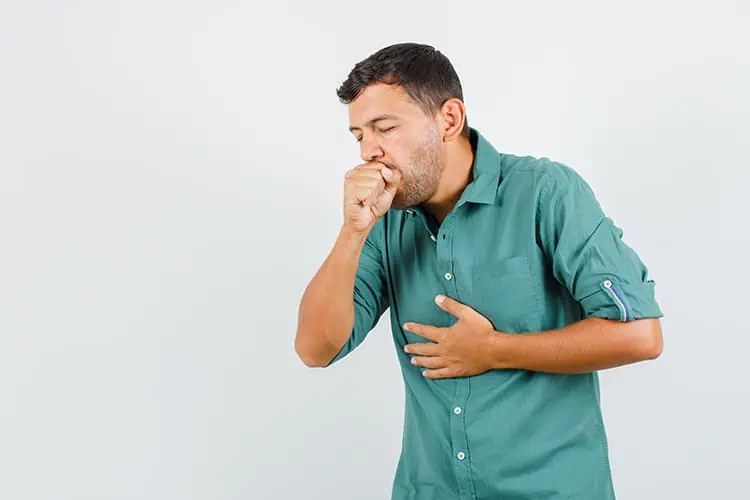
How to Do Overhead Kettlebell Squat for Strength & Mobility

Kettlebell Swings For Beginners Benefits And Techniques

Kettlebell Swings Benefits Burn Calories And Improve Posture

30 Days Workout Plan At Home Get Fit Without A Gym
Different Cough Types and How to Treat Them

Coughing is a common reflex action of the body that helps clear the air passages and expel irritants, mucus, and other foreign particles. However, not all coughs are the same, and the symptoms and causes may vary depending on the type of cough.
Different Types Of Coughs
Here are some of the different types of coughs and their symptoms:
1. Dry cough:
A dry cough is a non-productive cough that does not produce mucus or phlegm. It is usually caused by viral infections such as cold, flu, or allergies. The symptoms of a dry cough may include a tickling sensation in the throat, irritation, and soreness.
2. Wet or productive cough: Cough Types
A wet or productive cough is a type of cough that produces mucus or phlegm. This type of cough is often caused by infections such as bronchitis, pneumonia, or the flu. The symptoms of a wet cough may include chest congestion, wheezing, and shortness of breath.
3. Whooping cough:
Whooping cough is a highly contagious bacterial infection that causes intense coughing fits followed by a “whooping” sound as the person gasps for air. It is caused by the bacterium Bordetella pertussis and can be particularly dangerous for young children and infants. The symptoms of whooping cough may include fever, runny nose, and fatigue.
4. Chronic cough: Cough Types
A chronic cough is a persistent cough that lasts for more than eight weeks. It may be caused by underlying medical conditions such as asthma, acid reflux, or chronic obstructive pulmonary disease (COPD). The symptoms of a chronic cough may include chest pain, shortness of breath, and fatigue.
5. Smoker’s cough:
Smoker’s cough is a chronic cough that is caused by smoking. It is a type of dry cough that is often worse in the morning and may be accompanied by chest pain or wheezing. Smoker’s cough is a sign of lung damage and can lead to chronic obstructive pulmonary disease (COPD) and lung cancer.
6. Asthmatic cough: Cough Types
An asthmatic cough is a type of cough that is associated with asthma. It is often a dry cough that is worse at night or early in the morning. The symptoms of an asthmatic cough may include wheezing, shortness of breath, and chest tightness.
7. Postnasal drip cough:
Postnasal drip cough is a type of cough that is caused by excessive mucus production in the back of the throat. It may be caused by allergies, sinusitis, or a cold. The symptoms of a postnasal drip cough may include a runny nose, sore throat, and congestion.
8. Psychogenic cough:
Psychogenic cough is a type of cough that is caused by psychological factors such as anxiety, stress, or depression. The symptoms of a psychogenic cough may include a persistent cough that does not respond to medication, dryness in the throat, and hoarseness.
9. Allergic cough:
An allergic cough is a type of cough that is triggered by exposure to allergens such as dust, pollen, or animal dander. It is usually a dry cough that may be accompanied by wheezing or shortness of breath. The symptoms of an allergic cough may include a runny nose, itchy eyes, and sneezing.
Moreover, treatment for coughs can vary depending on the type of cough and the underlying cause. For instance, if the cough is caused by a viral infection, the doctor may prescribe antiviral medications or recommend over-the-counter medications to alleviate the symptoms.
However, if the cough is caused by an underlying condition such as asthma, acid reflux, or allergies, the doctor may recommend treating the underlying condition to alleviate the cough symptoms. In some cases, cough suppressants or expectorants may be recommended to reduce the severity of coughing.
In addition, lifestyle changes such as avoiding smoking, allergens, or irritants, staying hydrated, and practicing good hygiene can help prevent and alleviate cough symptoms.
Coughing is a reflex action that helps clear the air passages and expel irritants, mucus, and other foreign particles from the body. However, not all coughs are the same, and the symptoms and causes may vary depending on the type of cough. It is important to identify the type of cough and seek medical attention if the cough is persistent or accompanied by other symptoms. Additionally, lifestyle changes and appropriate treatments can help prevent and alleviate cough symptoms.
Most Recommended
Subscribe to our Newsletter
Stay up to date on the latest men’s health, fitness and lifestyle trends and tips.
About Us
Men’s Fit Club was started with the goal of empowering men to get the most out of their lives. This meant going beyond exercise and diet tips to really address the broad range of issues that men face on a daily basis – topics like recreation, finding love, sexual health and even sound fashion advice.
Quick Links
© COPYRIGHT MEN'S FIT CLUB 2025. All Rights Reserved

